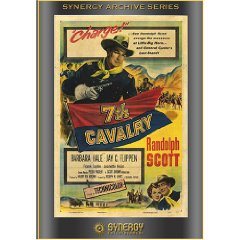
7th CAVALRY
US, 1956, 75 minutes, Colour.
Randolph Scott, Barbara Hale, J.C. Flippen, Denver Pyle, Michael Pate, Russell Hicks.
Directed by Joseph H. Lewis.
7th Cavalry is one of many films produced by Randolph Scott’s company. At this time, in the mid-50s, he made films like A Lawless Street, Seven Men From Now. After appearing in a wide variety of films in the 30s and 40s including some musicals with Fred Astaire and action films like Captain Kidd with Charles Laughton, from 1948 to 1962 he made only westerns, thirty-five of them. Joseph H. Lewis directed a number of B-budget films including several westerns including directing Scott in this film and A Lawless Street.
Barbara Hale was a leading lady of the time and was to make her mark as Della Street with Raymond Burr as Perry Mason. The rest of the cast are familiar faces from many westerns. It was an early Hollywood film for Michael Pate who has a substantial role.
1.A cavalry western? The tradition of this kind of western, especially the epics of John Ford? This film being more focused?
2.The background of Little Big Horn, General Custer, his character, decisions, the massacre? The tradition of films about Custer including They Died With Their Boots On, Fort Apache and Custer of the West?
3.The locations, colour photography, the atmosphere of the west, the fort, the mountains, the valley of the Little Big Horn? The musical score?
4.The focus on character, interactions rather than action sequences or battles? The Little Big Horn battle being reported rather than shown?
5.The introduction to Tom Benson, his arrival at the fort, with Martha Kellogg? The planned marriage? Entering the fort, Mrs Reynolds and her attack on Benson? The scroungers and their survival? Bates and his explanation of what happened? The return of the other men? The attack on Benson for being the close friend of Custer, for Custer having sent him away, for his survival?
6.Randolph Scott as Benson, the revelation of his background as a gambler on the boats on the rivers? His love for Martha? His not going to West Point and his being despised for this? Colonel Kellogg and his antipathy towards him? The men and their disregard? His being isolated? The hearing, his interventions on behalf of Custer, his being silenced? The need for the burial group to go to Little Big Horn, his volunteering, his taking Bates and the disreputable soldiers, drilling them and training them? His travelling to Little Big Horn, going through the Sioux’s arrow and defying them? The arrival of the Sioux, the group being surrounded, the men and their hostility, the attempts to kill him, Bates saving his life? The irony of the corporal and his riding the horse, its resemblance to Custer’s horse? The Indians and their response, the cavalry and their being able to escape and return? The vindication of Benson, Kellogg and his apology, Martha standing by him all the time? The pride in the cavalry?
7.Martha, the colonel’s daughter, her love for Tom, standing by him, defying the others? Her being vindicated?
8.Bates, his surviving? His obeying Benson, going on the mission? His shooting the attacker? His wanting to take over, his backing down? The other scroungers, their complaints, on the way, the attempt to kill Benson? Their behaviour, the man who wanted to get out, the arrow in the back?
9.The military hearing, the various captains and their comments, the detailed analysis of Custer, his arrogance, his decisions, the orders, the massive group of Indians, the captains and their inability to support Custer? The massacre?
10.The Indians, the resentments, the comment that the Indians thought they owned the land? Their surrounding the funeral detail? The Indian who was educated, his talking with Benson, explaining the role of the spirits, their entering into the Indians, the spirit of the horse – and then the arrival of the horse, their withdrawing and letting the cavalry through?
11.A brief but interesting picture of the background to Little Big Horn?